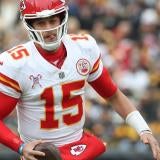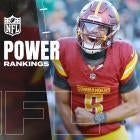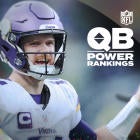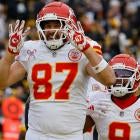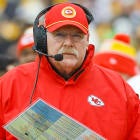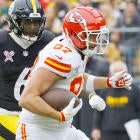 |
| Former Oilers quarterback Dan Pastorini still attends some Houston games. (US Presswire) |
Dan Pastorini was a playboy in his prime as a standout quarterback for the Houston Oilers. From 1971 to 1979, he played for Sid Gillman and Bum Phillips in Houston, making the Pro Bowl in 1975 and leading the team to the playoffs twice in the late 1970s. In the before, during and after of his career, he married a Playboy model and dated Farrah Fawcett (!), raced cars, posed for Playgirl (!!) and nearly killed himself with his recklessness. After football, he’s had a number of afflictions, declaring bankruptcy and getting arrested on a DWI charge in 2010.
It’s been quite a ride for Pastorini -- who, along with Houston media personality John P. Lopez, released the book “Taking Flak: My Life in the Fast Lane” last year. In his autobiography, Pastorini holds nothing back, which makes for some fun stories and some cringe-worthy moments. Most of all, though, the book is a pleasure to read, because, for much of it, you think to yourself, “Man, that must have been some kind of life to live.”
We caught up with Pastorini several months ago to discuss why he was so honest in his book, how he's dealt with the transition from athlete to ordinary citizen, and how fast he's ever raced in a car.
1. CBSSports.com: What’s the reason for doing the book in the first place? It seems like you open yourself up.
Dan Pastorini: I did. A lot of my friends over the years have asked me why I hadn’t written a book. I didn’t feel it was the right time to do so. John approached me and I’ve known John for years as a writer in the Houston area. He knew me well enough, and I thought it'd be a good idea. I told him, ‘I want to be totally honest. Brutally honest. Some stuff will be very difficult to talk about.’ I told him as a joke, “But I did inhale, and I did have sex with those women.’ That was kind of the premise of it.
He did a lot of research. I didn’t think I had that interesting of a life, but the more he did research, the more questions he asked. Before we knew it, we had 42 hours of interviews. We came up with the draft and narrowed it down, because the book could have been 3,000 pages. It talks about the trials and tribulations of what I went through as a child, in college, in the pros and in racing. The good, the bad and the ugly.
I think he did a really good job of taking people through a journey of my life. I had setbacks with my family. My brother-in-law ripped me off early in my career as my confidant and my agent. We talk about the troubles I had with my daughter after the divorce of her mother and the years taken to rekindle that relationship. … There’s the dealings I had with Al Davis. Then, there’s some of the marriage situations and some of the girlfriend situations. We kind of delved into the stuff he thought people would want to read about.
2. CBSSports: If you’re going to put yourself out there like that, there’s a lot of stuff that has to be … I’m sure there’s great stuff about how you were a playboy, but there has to be stuff that’s embarrassing.
Pastorini: Sure. Again, we cover it. It was a cathartic experience. It’s one I don’t regret. At the end of the book, I was very reluctant and uncomfortable. I said, ‘Jeez, maybe I exposed myself too much here. Did I really need to say all that?’ John assured me that yes, I did. Now we’ve had people come to book signings and pull me aside and thank me for being honest because it’s helped them deal with their own demons and addictions. For that, I’m grateful. That’s made the book worthwhile for me.
3. CBSSports.com: That’s interesting. Obviously you know your role as an athlete and how people looked up to you in the prime of your career with the Oilers. But that’s got to be cool to put yourself out there and maybe not expect to have that kind of impact. If they’re coming to you and saying, ‘I had the same issue. It helps to know other people are out there,’ that’s got to be rewarding for you, too.
Pastorini: It humanizes us. It shows the duality of the private man and the celebrity. There’s a fine balance to that. We’re human. Life isn’t all roses when you’re a celebrity or an athlete. You do have drawbacks. You have people taking shots at you. You have people who are with you because of who you are and not what you are. I was a small town boy and I got turned loose in a big city in the ‘70s. Things were wild and people were making money. At the time, it was about openness and freedom. But there’s a time when you have to stop all that.
CBSSports.com: You were in the spotlight for much of your life and your career. Now you turn the tables a little bit and you become the guy who’s writing things that other people might not like. What’s that like to be almost a reporter? Did you feel that way?
Pastorini: Not really a reporter. John did all the research and the writing. I just did the commentary. Like I said, being honest, if you commit to that, it’s easier to do. The hardest thing for any addict to do is to admit they have a problem. It was pretty obvious. I didn’t have a problem drinking. I had a lot of problems from drinking. Until you take that step and that faith that you can beat this, you’ll never beat it. You have to commit to yourself and the people who are around you, and you have to separate what’s important in your life. That wasn’t difficult for me to do. The only people I’m criticizing is me. I’m not one to point the fingers at anybody else. When I’m being honest about myself, I don’t worry about criticizing.
4. CBSSports.com: Is it a difficult transition being the athlete with the spotlight to being a normal citizen? Was that part of the problem? I know you went into car racing. I don’t know if that was because of the adrenaline thing …
Pastorini: No, I loved racing. I love racing to this day. I’d go racing today if somebody offered me a ride. If I could have raced, I might not have ever gone into football. It’s not an adrenaline thing. I just enjoy the sport. It takes a special breed of cat to drive one of those cars 300 mph, although I never went that fast. But I got close.
CBSSports: How fast did you go?
Pastorini: 287.
CBSSports.com: Holy crap … In what kind of car?
Pastorini: In a top fuel dragster on a quarter-mile.
CBSSports.com: Wow ... but is it a difficult transition?
Pastorini: It’s a difficult transition to go from athlete to common citizen. That duality of celebrity and private man. Now you have to apply your skills to get out and get a job or be part of a company or start your own company. There’s a lot of soul searching. It’s adjusting and being able to adjust on the fly and adapting to your surroundings. It’s a constant trek. You just have to learn to adjust with the time and figure out something to do. But it’s not easy.
5. CBSSports.com: We’ve talked about this before, but you worry about past head injuries and if your memory will be there in the next few years. There’s been a lot of cases of dementia and CTE. I don’t know if that played a role in this book, but did you want to get your memories out there before you start to lose them?
Pastorini: No, I never really thought of it that way. It was just time for me to write a book.
For more NFL news, rumors and analysis, follow @EyeOnNFL on Twitter, and subscribe to our Pick-6 Podcast and NFL newsletter. You can follow Josh Katzowitz on Twitter here: @joshkatzowitz.



